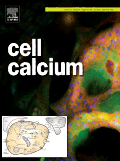
Purinergic Signalling
Scope & Guideline
Decoding the Language of Purines in Life Sciences
Introduction
Aims and Scopes
- Purinergic Signaling Mechanisms:
Exploration of the biochemical pathways and molecular mechanisms involving purines, including ATP and adenosine, in cellular communication and signaling. - Role in Disease Pathology:
Investigation into how purinergic signaling contributes to the pathophysiology of various diseases, including cancer, neurodegenerative diseases, cardiovascular conditions, and inflammation. - Therapeutic Applications:
Research on potential therapeutic approaches targeting purinergic receptors and signaling pathways for the treatment of diseases such as cancer, pain, and inflammatory disorders. - Neuropharmacology:
Studies on the effects of purines on the nervous system, including their roles in neuroprotection, synaptic transmission, and neuroinflammation. - Cellular and Molecular Biology:
Research focusing on the cellular mechanisms of purinergic signaling, including receptor expression, signal transduction, and interactions with other signaling pathways.
Trending and Emerging
- Purinergic Signaling in Cancer:
A growing body of research is investigating the roles of purinergic receptors, especially P2X and P2Y families, in tumor progression, metastasis, and the immune response in cancer. - Neuroinflammation and Neurodegeneration:
There is an emerging focus on the role of purinergic signaling in neuroinflammatory processes and neurodegenerative diseases, highlighting its potential as a therapeutic target. - Electroacupuncture and Pain Management:
Recent studies are increasingly exploring the role of purinergic signaling in the mechanisms of acupuncture analgesia, positioning it as a promising area for pain management research. - Microglial Function and Purinergic Modulation:
Research on microglial cells and their purinergic signaling pathways is trending, emphasizing their role in neuroinflammation and brain health. - Machine Learning in Purinergic Research:
The application of machine learning techniques to identify novel ligands and predict receptor interactions is an emerging trend, indicating a shift towards more computational approaches in purinergic research.
Declining or Waning
- Historical Perspectives on Purinergic Research:
Papers focusing on historical reviews or tributes to foundational figures in purinergic research have decreased, suggesting a shift towards more contemporary applications and findings. - Basic Science without Clinical Relevance:
There is a noticeable reduction in publications that are strictly focused on basic science without clear clinical implications, as the journal appears to be prioritizing studies with direct therapeutic relevance. - Purinergic Mechanisms in Non-Mammalian Models:
Research on purinergic signaling in non-mammalian systems has become less frequent, indicating a possible shift towards mammalian models that are more relevant to human health and disease.
Similar Journals

INTERNATIONAL JOURNAL OF EXPERIMENTAL PATHOLOGY
Advancing Knowledge in Experimental PathologyINTERNATIONAL JOURNAL OF EXPERIMENTAL PATHOLOGY, published by Wiley, is a leading peer-reviewed journal dedicated to the field of experimental pathology. With an ISSN of 0959-9673 and E-ISSN 1365-2613, the journal has been a vital resource for researchers and professionals since its inception in 1990, covering a broad spectrum of topics within pathology, cell biology, and molecular biology. The journal's relevancy is underscored by its Q2 ranking in Pathology and Forensic Medicine and Q3 rankings in both Cell Biology and Molecular Biology, as of 2023, reflecting its significant contribution to the scientific community. Although it does not currently offer open access options, readers can benefit from its insightful research articles and reviews that guide advancements in diagnostic pathology and therapeutic strategies. As the journal continues to evolve, it remains committed to facilitating the exchange of innovative ideas and findings that drive progress in experimental pathology and related fields, making it an indispensable platform for scientists, clinicians, and students alike.

FEBS LETTERS
Advancing the Frontiers of Biological ScienceFEBS LETTERS, published by Wiley, is a prestigious journal that has firmly established its place in the fields of biochemistry, biophysics, genetics, molecular biology, cell biology, and structural biology. With an esteemed history dating back to 1968, this journal continues to be a vital resource for researchers and professionals involved in the biological sciences. It boasts impressive quartile rankings, including Q1 statuses in several categories such as Biochemistry and Genetics, reflecting its high impact factor and significant contribution to scientific discourse. FEBS LETTERS provides a platform for innovative findings and critical reviews, fostering the exchange of knowledge and ideas within the scientific community. Although it operates under a subscription model, the journal ensures broad dissemination of groundbreaking research through its rigorous peer-review process. The vibrant discussions encouraged by articles published in FEBS LETTERS aim to inspire current and future generations of scientists to push the boundaries of biological understanding, making it an indispensable resource for anyone dedicated to advancing their knowledge in these dynamic fields.

EUROPEAN JOURNAL OF HISTOCHEMISTRY
Innovating methodologies for a deeper understanding of life sciences.European Journal of Histochemistry (ISSN: 1121-760X; E-ISSN: 2038-8306) is a distinguished peer-reviewed scholarly journal published by PAGEPRESS PUBL based in Italy. Since its inception in 1992 and with a commitment to Open Access since 2010, the journal has played a pivotal role in disseminating high-quality research in the fields of Histology, Biophysics, and Cell Biology. As of 2023, the journal holds a commendable position within the academic community, achieving Q2 rankings in Biophysics, Histology, and Medicine (miscellaneous), further highlighting its relevance and impact in these critical areas of research. Despite its HIndex not being specified, its Scopus rankings demonstrate the journal's competitive edge, particularly in Histology (Rank #33/62) and Biophysics (Rank #84/152). The journal aims to provide a platform for researchers to share innovative findings and contribute to the enrichment of knowledge in histochemical methodologies and their application to biomedical sciences. Its Open Access model ensures the broadest possible dissemination of research, making it an essential resource for researchers, professionals, and students alike who are engaged in the life sciences. For more information, visit the journal's webpage hosted by PAGEPRESS PUBL.

BMC Molecular and Cell Biology
Championing high-quality insights in molecular and cell biology.BMC Molecular and Cell Biology is a forward-thinking open-access journal published by BMC, specializing in the vital fields of molecular biology and cell biology. Since its inception in 2019, the journal has carved a niche for itself, ranking in the Q3 quartile in both Cell Biology and Molecular Biology categories as of 2023. With an ISSN of N/A and an E-ISSN of 2661-8850, the journal provides a platform for groundbreaking research, high-quality reviews, and innovative methodologies. Situated in the United Kingdom, BMC Molecular and Cell Biology promotes a diverse range of studies, addressing fundamental questions in biology that resonate with both experts and new researchers alike. The journal's commitment to open access ensures that valuable findings are readily available to the global scientific community, fostering collaboration and knowledge-sharing across disciplines. Researchers aiming to contribute to the field of cell and molecular biology will find this journal an indispensable resource for both publishing and staying informed on the latest advances.

CELL CALCIUM
Exploring Calcium's Impact on Health and DiseaseCELL CALCIUM is a premier journal published by ELSEVIER SCI LTD, focusing on the critical role of calcium in cellular processes, making it an essential read for researchers and professionals in the fields of Cell Biology, Molecular Biology, and Physiology. Having been in publication since 1980, this journal is well-regarded, holding a Q2 ranking in Cell Biology and Molecular Biology, as well as a prestigious Q1 status in Physiology for 2023. With an impressive Scopus ranking that places it in the top 20% of journals in its categories, CELL CALCIUM aims to disseminate original research articles that advance the understanding of calcium signaling mechanisms and their implications in health and disease. Although not available via open access, its insights are critical for advancing knowledge and fostering collaboration within the scientific community. The journal is located in the United Kingdom, with its editorial excellence helping to promote high-impact research that continues to influence both academia and industry.

BIOSCIENCE REPORTS
Connecting Researchers with Groundbreaking FindingsBIOSCIENCE REPORTS, published by Portland Press Ltd, is a prestigious journal dedicated to advancing the fields of biochemistry, biophysics, cell biology, and molecular biology. Founded in 1981, the journal has established itself as a vital resource for researchers and professionals, boasting a significant impact factor and high rankings within its categories, including Q2 in Biochemistry and Q1 in Biophysics as of 2023. The journal’s commitment to high-quality, peer-reviewed research ensures that it remains an influential platform for the dissemination of cutting-edge scientific findings. While it operates under a traditional subscription model, it offers various access options to accommodate the needs of the scientific community. With ongoing publication through 2024, BIOSCIENCE REPORTS continues to play a crucial role in shaping discussions in the life sciences and fostering innovative research in biology.

CELLULAR AND MOLECULAR BIOLOGY
Unveiling the Secrets of Biochemical ProcessesCellular and Molecular Biology is a prominent academic journal published by C M B ASSOC, specializing in the dynamic fields of cellular and molecular biology. Established in 1977, this journal has consistently aimed to disseminate groundbreaking research that contributes to our understanding of biochemical processes, cell dynamics, and molecular mechanisms governing life. With its ISSN 0145-5680 and E-ISSN 1165-158X, the journal plays a vital role in the exchange of innovative ideas, evidenced by its coverage of research from 1977 to 2024. Although currently categorized in the Q4 quartile for major disciplines such as Biochemistry and Cell Biology, it is dedicated to fostering the development of the field by welcoming submissions that challenge the conventional understanding and lead to novel insights. Researchers and academics looking to contribute to or stay updated in the rapidly evolving landscape of molecular biology will find this journal a valuable resource for connecting with a global community of scientists.

ACTA BIOCHIMICA ET BIOPHYSICA SINICA
Transforming Knowledge into Innovation in Life Sciences.ACTA BIOCHIMICA ET BIOPHYSICA SINICA, an esteemed journal published by SCIENCE PRESS, is a leading platform in the fields of biochemistry, biophysics, and molecular biology. Based in the United Kingdom, this journal has consistently ranked in the Q2 category for Biochemistry, Biophysics, and Medicine (miscellaneous) in 2023, showcasing its commitment to high-quality research and innovation in life sciences. With a convergence period extending from 1996 to 2024, it features critical insights into biochemical and biophysical processes that underlie biological phenomena. Researchers and professionals seeking to stay at the forefront of discoveries will find its articles to be both informative and transformative. Although not an open-access journal, ACTA BIOCHIMICA ET BIOPHYSICA SINICA aims to advance knowledge and foster collaboration among scientists worldwide, emphasizing its role in the dynamic landscape of biomedical research.

INTERNATIONAL JOURNAL OF BIOCHEMISTRY & CELL BIOLOGY
Leading the Charge in Biochemical and Cellular DiscoveriesThe International Journal of Biochemistry & Cell Biology, published by Pergamon-Elsevier Science Ltd, stands as a pivotal resource in the fields of biochemistry and cell biology. With an ISSN of 1357-2725 and an E-ISSN of 1878-5875, this prestigious journal has been a key platform for disseminating cutting-edge research since its inception in 1995. The journal currently holds an impressive Q1 ranking in Biochemistry and a Q2 ranking in Cell Biology for the year 2023, reflecting its commitment to high-quality research and its influence within the scientific community. With a significant Scopus ranking of 94/438 in Biochemistry and 96/285 in Cell Biology, the journal plays a crucial role in advancing knowledge and fostering innovative approaches in these dynamic fields. Though it is not an open-access journal, the International Journal of Biochemistry & Cell Biology remains accessible to a wide audience, making it a vital resource for researchers, professionals, and students alike, who are eager to explore and contribute to the ongoing advancements in biochemistry and cell biology.

ACTA HISTOCHEMICA
Pioneering Research at the Intersection of Histochemistry and MedicineACTA HISTOCHEMICA, a prestigious journal published by Elsevier GmbH, is dedicated to advancing the field of histochemistry and its applications within cell biology and medicine. With an ISSN of 0065-1281 and an E-ISSN of 1618-0372, the journal provides a critical platform for the dissemination of high-quality research findings and reviews, integral for both emerging and established scholars. Since its inception in 1954 and continuing through to 2024, ACTA HISTOCHEMICA has maintained a strong commitment to publishing significant advancements in histology and cell biology, as evidenced by its categorization in Q3 for Cell Biology and Histology, as well as Q2 in miscellaneous medicine for the year 2023. The journal ranks favorably in Scopus, holding the 27th rank in Histology and a 200th rank in Cell Biology, highlighting its importance to the academic community. With its headquarters in Munich, Germany, ACTA HISTOCHEMICA continues to attract contributions from global researchers, fostering an international dialogue essential for the growth of knowledge in histochemistry and related disciplines.